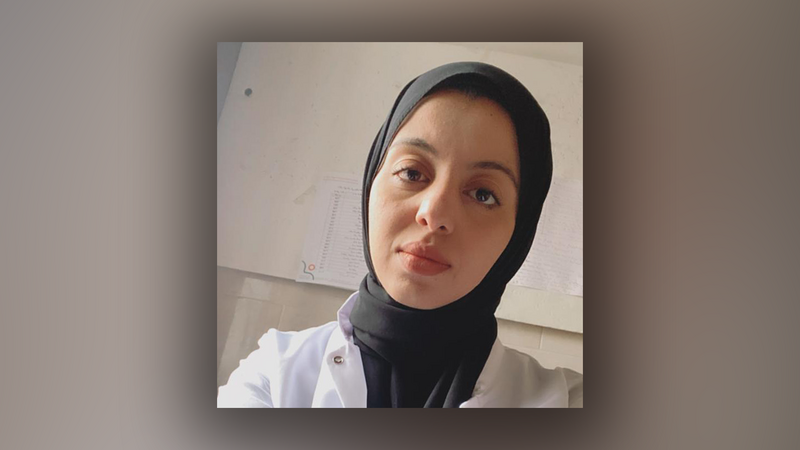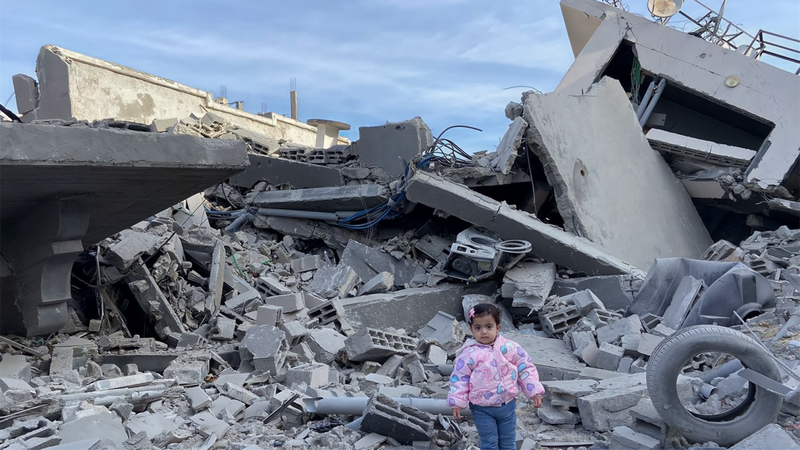The Electronic Intifada 13 March 2025

Israa Abu Rukba.
During the 100-plus-day siege of Jabaliya refugee camp that started in early October last year, Israel’s relentless bombardment and devastation forced families into unimaginable situations.
Dr. Israa Abu Rukba, a 30-year-old obstetrician and gynecologist, fought two parallel battles: one to provide vital health care at Al-Awda Hospital; the other to shield her daughter, Mariam, who was nine months old when the Israeli attacks began in October 2023, from the horrors of war.
Before the Israeli attacks, Israa had a well-established career at Al-Shifa Hospital, then Gaza’s largest medical facility. However, when Israel’s genocidal aggression escalated, she relocated her work to the much smaller Al-Awda Hospital in the Jabaliya camp to stay close to her family.
Israa knew she had no option but to stay and provide medical aid to those in need. With her husband Imad, also a doctor at Al-Awda, and their daughter, she sought shelter in the hospital, which was only a five-minute walk from their home.
What they thought would be a temporary stay, however, turned into a grueling ordeal, as they found themselves trapped, struggling to survive.
With explosives-laden remote-controlled robots patrolling the area, and the constant demolition of nearby residential buildings, the hospital felt like a “suffocating prison,” Israa said.
Boom!
The massive bombardment in the area regularly caused hospital windows to shatter on her and her family. Doors were torn from their frames by the heavy blasts, creating the need for constant repairs.
Electricity was limited to two hours a day because the Israeli military refused to allow in fuel for the generators. The acrid scent of dust from nearby bombings clung to clothing and hair.
The overwhelmed hospital, which normally has bed space for just 30 patients, housed over 150 people, including staff and relatives of patients, while Israa and her family were there, she said. Extra beds were added, and patients had to stay in the emergency room due to the lack of available space in the wards.
Every explosion sent little Mariam running into her arms, Israa said. “Mama, boom! I hear it,” she would cry, seeking comfort.
One night, while Israa held Mariam, a missile struck the hospital, shaking the building and filling the air with dust. Israa quickly moved her daughter to a safer spot, but Mariam woke up crying, confused and scared.
“Since then,” Israa recalled, “she hasn’t slept the same. Her nights are restless, haunted.”
Impossible to hide
Despite Israa’s efforts to shield Mariam from the horrors around her, the truth was impossible to hide. Every time Mariam saw a wounded patient, she would point and say, “Mama, uncle ouch,” or “Mama, aunt ouch.”
As the Israeli military siege dragged on, life became almost unbearable, Israa told The Electronic Intifada. October’s warmth gave way to winter’s chill, and the hospital’s freezing interior made living even harder.
With few belongings and insufficient clothing, Israa grew increasingly desperate. On 30 December she made the potentially dangerous journey home alone, leaving Mariam in what she hoped was a safe part of the hospital. The streets were perilous due to ongoing shelling and drone surveillance, but Israa managed to retrieve essential winter clothing for her daughter.

Mariam stands by the rubble of the family’s home in Jabaliya refugee camp.
Frequent shortages of essentials like food and drinking water added to the misery. The Red Cross/Red Crescent occasionally transported patients from northern Gaza City and tried to deliver food for medical staff and the wounded. But Israeli soldiers often confiscated the food at the checkpoint, stopping it from reaching those in need, Israa said. She also said that water systems were deliberately destroyed. Damaged filters and tanks made clean drinking water a rare and precious resource.
Israa and her family, like the other medical staff and patients, depended on limited food supplies, including pasta, lentils, beans and peanut butter that were part of the stored pre-siege aid.
“For Mariam’s milk, I had to boil water multiple times using a small boiler to make it safe for her to drink,” Israa said.
Ordered to evacuate
On 3 January, the Israeli army used a Palestinian detainee to deliver a handwritten message ordering the evacuation of the hospital by 3 pm, Israa said. This caused widespread panic among staff and patients.
The hospital administration contacted the Red Cross, which said the note did not amount to a formal military order but rather an individual soldier’s demand. Such confusion characterized the time in the besieged hospital. Ultimately, the hospital did not evacuate, but the threat of an attack remained constant.
When the ceasefire went into effect on 19 January, it brought relief but no joy, she added.
“After all the bombing and endless blasts, I imagined stepping outside to find no trace of life.”
Mariam often asked, “Mama, bye?” desperate to leave the hospital and see the world beyond, said Israa, who herself feared what awaited – a world reduced to ruins.
When they finally managed to leave the hospital, they found their home in Jabaliya camp gone – reduced to rubble like so many others. The devastation was total, the loss overwhelming, Israa said.
She, Imad and Mariam are now staying with Imad’s sister while searching for a more stable place.
As both a doctor and a mother, Israa says she is haunted by her choices.
“I ask myself if I wronged my child,” she admits. “But I had no choice. I couldn’t abandon her, and I couldn’t leave my patients to suffer alone.”
Malak Hijazi is a Gaza-based writer.





